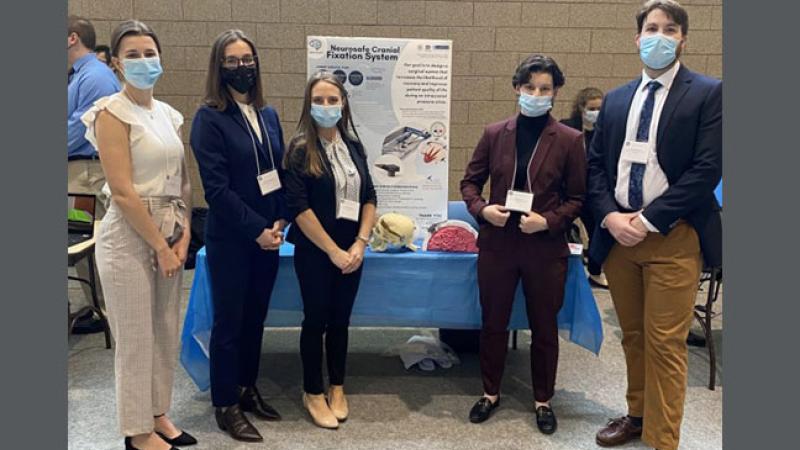October 14, 2022

Rensselaer Polytechnic Institute is renowned for innovative ideas and research. However, less is known about how Rensselaer students are actively instructed, advised, and encouraged on how to make their world-changing ideas reality.
Sonya Heldman, an MBA candidate in the Lally School of Management with a concentration in life sciences entrepreneurship, is a student who has thrived in Rensselaer’s culture.
Heldman earned dual bachelor’s degrees from Rensselaer in biomedical engineering and design, innovation, and society in 2022. Her team’s biomedical engineering capstone project even won the National Institute of Biomedical Imaging and Bioengineering (NIBIB) and VentureWell prize of $15,000 for their design of the Neurosafe skull fixation device!
The Neurosafe skull fixation device “provides the structural support needed to protect the vulnerable brain after operation while incorporating movement to accommodate brain swelling and subsequent shrinkage.” Heldman developed the device with her teammates Katrina Bliss, Alexandra Bisaccia, Taylor Keyt, and Grady Habicht.
The inspiration for Neurosafe came from the team’s project mentor, Mousa Hamad, who noticed the need for a novel solution in his neurosurgical residency at Montefiore Medical Center/Albert Einstein College of Medicine.
“Hamad approached us with the idea to recreate a surgical flow and allow the bone flap to reside in the patient's skull as they heal,” said Heldman. “This alteration of surgical flow has the potential to eliminate a $100,000 surgery… as well as a period of extreme vulnerability for the patient in which their brain has no rigid protective barrier.”
In between her MBA studies, Heldman will travel to the Biomedical Engineering Society Annual Meeting in San Antonio, Texas, in October to accept the award on behalf of her team and present their findings.
“There is a need for business professionals who can accelerate the rate that groundbreaking research and clinical observation, as seen in this project, becomes translated into treatments that can be implemented into new standards and protocols or toward commercialization,” said Heldman. “I hope to position myself to become a leader in the med tech space and build a career driven by the goal of improving people's quality of life, as well as examining social structures that result from our design decisions in the medical space. In the next few years, I hope to ask big questions such as this and engage with a highly collaborative team of innovators across disciplines. Rensselaer is that place for me right now.”